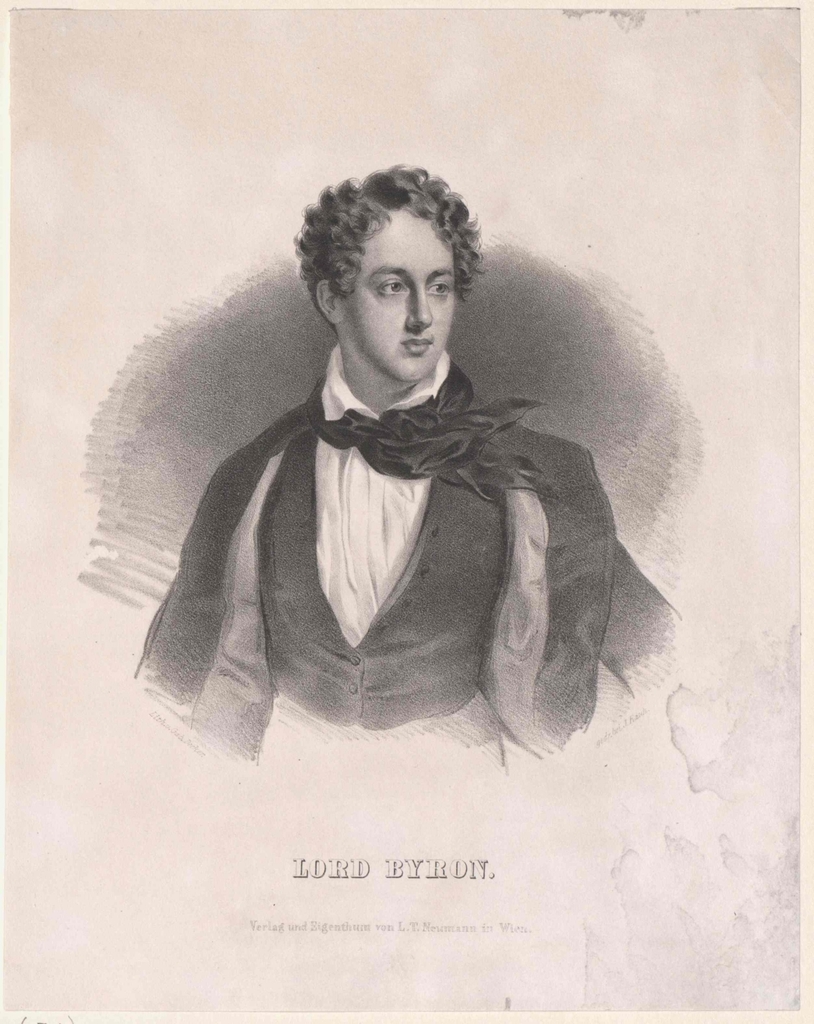Lord Byron

Lord Byron was a British poet and satirist, whose personality and poetry managed to capture the imagination of most of Europe at the time. He was born in London on the 22 of January, 1788 England and died on the 19 of April 1824, Missolonghi, Greece.
Byron was the son of the handsome and extravagant Captain John, also known as Mad Jack, his mother Catherine Gordon was a Scotish heiress. After Captain John had wastes most of Catherine’s fortune they were forced to move back to Scotland and live a very simple life. In 1798 when Geroge was only 10 he inherited the title and estate from his uncle Baron Byron. In 1801 he returned to London and attended the school of Harrow, one of England’s most prestigious schools. In 1805, he went on to study at Trinity Colege Cambridge, where he was able to accumulate a great deal of debts at an alarming rate, whilst indulging in the coventional vices of an undergraduate student. Byron’s first published volume of poetry was entitled Hours of Idleness, and was published in 1807. When he became of legal age in 1809, together with his friend Hobhouse he embarked on his first Grand Tour. They sailed to Lisbon, then proceede overland to Spain, Gibralta, Malta through Albania and on to Greece. It is here that the poet started writting one of his most acclaimed works Childe Harold’s Pilgrimage, which was to bring him instant fame. The following year they continued their trip to Costantinople and visited the site of Troy. Byron’s sojourn in Greece was to have a lasting impression on the poet. Eventually 1811, he returned to London, and in 1812 the first two cantos of Childe Harold’s Pilgrimage were published. The poem describes the travells and the thoughts of a disilusioned young man. In the poem Byron reflects upon the vanity of ambition, the transitory nature of pleasure, and the futility of the search for perfection over the course of a “pilgrimage”. During this period the poet had numerous love affairs with many women among which his half sister. Trying to escape his love affairs Byron married Anne Isabella Milbanke in 1815 with whom he had a daughter Augusta Ada. From the onset the marriage was doomed by the big differnce between Byron and his unimaginative and humorless wife; eventually in January 1816 Annabella left Byron and went to live with her parents, amid swirling rumours concerning his relations with Augusta Leigh and his bisexuality. The couple obtained legal seperation the same year, but owing to the great amount of moral indignation directed at the poet, he felt very hurt and left England in 1816 never to return.
Byron sailed up the river Rhine and settled in Geneva, (Switzerland) near Percy Byshee Shelley and Mary Godwin (soon to be Mary Shelley) and her half sister Claire Clermont, with whom Byron had an affair and a daughter named Allegra born in January 1817. During this period in Geneva, he wrote the third canto of Childe Harold’s Pilgrimage which detailed his trip down the Rhine from Belgium to Geneva. In October 1817 Byron departed for Italy and spent a period of time in Venice where he had a love affair with his landlord’s wife Marriana Segati, soon afer in May he joined his friend Hobhouse in Rome, of which his impressions are recorded in the fourth canto of Childe Harold, furthermore during his sojourn in the eternal city he wrote Beppo, a poem in ottava rima that satirically laid out the contrasts between Italian and English manners. He was to further use the same mock-heroic style of writting, that was to chracterize one of his greatest unfinished poems Don Juan published in 1819. Byron completed 16 cantos of the work, but the 17th remained uncompleted due to his illness and subsequent death. In 1818 Shelley and other who visited Byron, found he had grown fat, with long hair and turning gray, looking far older than his years, and sunk in sexual promiscuity. But a chance meeting with Countess Teresa Gamba Guiccioli, who was only 19 at the time, was to change the course of his life. In 1820 whilst accompanying her to Ravenna he was initiated by her father and brother into the secret society of the Carbonari and its revolutionary aim to free Italy from Austrian Hungarian rule. In April 1823 whilst living in Genova, he accepted to act as an agent for the London Committee, which had been set up to help the Greeks in their strugle for indipendence from Ottoman rule. He set sail for Chephalonia three months later in July. Byron made efforts to unite the various Greek factions, as well as donating money to the cause, and took personal command of a brigade of Souliot soldiers, reputedly the bravest of the Greeks. But a serious illness weakened him, and in April he contracted a fever from which he died at Missolonghi on April 19. Deeply mourned, he became a symbol of disinterested patriotism and a Greek national hero celebrated to this day. His body was brought back to England, but was refused burial in Westminster Abbey.
When We Two Parted
When we two parted
In silence and tears,
Half broken-hearted
To sever for years,
Pale grew thy cheek and cold,
Colder thy kiss;
Truly that hour foretold
Sorrow to this …
